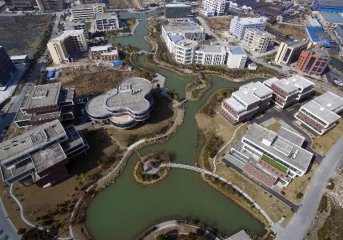
Traffic congestion has long plagued China's urban dwellers, but a recent directive aimed at solving the problem has failed to gain unanimous support. The directive, issued by the State Council on Sunday, says that roads in new communities will be open to the public as part of the urban road system, and existing gated communities will gradually open their roads.
Though some welcomed the directive, many more expressed their concern that opening gated communities could lead to public safety risks, noise and air pollution. The debate was especially fierce among China's new middle class, a large number of whom owe their wealth to rising housing prices in megacities.
An online poll conducted by the web portal qq.com showed that as of Wednesday afternoon, more than 120,000 netizens had objected to opening gated communities, with only 41,000 in favor of the proposal.
Some linked the directive with housing prices, wondering whether the prices of high-end gated communities will fall after losing their selling points of privacy and security. Many opposed to the changes cited a clause in China's first Property Law, which says roads and lanes in gated communities are owned by all proprietors, and a decision to open the community must be approved by all.
Even if a community is opened, how residents will be compensated is another question. "When we purchased a house, all public areas such as parking spaces and green lawn space were factored into the price tag. So how will that be calculated?" asked a web user with the screen name "Xiaozhu" on qq.com.
Lou Jianbo, a legal expert on housing at Peking University, said it is good for people to have concerns, which shows they have started to pay attention to property rights, but these concerns are an overreaction. "The directive is only a general document and its implementation is still subject to further detail," said Lou.
Wu Zhiqiang, deputy president of Tongji University in Shanghai, said the directive has been misunderstood by the public. Opening gated communities does not necessarily mean tearing down walls in all cities, said Wu, noting only big compounds and very large gated communities created for historical reasons must open to the outside.
For instance, a large steel and iron plant with a two- or three-mile wall fencing in factory buildings, research buildings and living quarters should tear down the barriers to let vehicles and pedestrians pass. But the debate still went on, with a judge from the Supreme People's Court weighing in on Tuesday.
"There is still a continuing process to realize the rule of law through legislation," Cheng Xinwen said at a press conference on Tuesday while explaining the 2007 Property Law, hinting at possible revisions to the law.
While acknowledging the government's good intentions, experts also noted the need to heed the opinions of the public and protect their legitimate interests. If the policy is carried out, those who incur losses should be properly compensated, said Lou, the expert, adding more specific rules are needed to ease people's concerns.



















Latest comments